- Home
- Elizabeth George
In the Presence of the Enemy Page 4
In the Presence of the Enemy Read online
Page 4
It’s good for your soul, Luxford had said in a tone that tried to achieve wry amusement although what he had thought was, Shouldn’t he be reading about dinosaurs at his age? About constellations? About big-game hunters? About snakes and frogs? Why in hell was an eight-year-old reading about a fourteenth-century painter? And why was his mother encouraging him to do so?
They were too close to each other, Luxford thought not for the first time. Leo and his mother shared too much of the same soul. It would do the boy a world of good when he was finally packed off to the Baverstock School for the autumn term. Leo didn’t like the idea, Fiona liked it less, but Luxford knew it would serve them both well. Hadn’t Baverstock done as much for him? Made him a man? Given him direction? Wasn’t being sent off to public school the reason he was where he was today?
He quashed the thought of where he was today, tonight, this minute. He had to obliterate the memory of the letter and everything that had followed from the letter. It was the only way to maintain the facade.
Still, thoughts lapped like small waves against the barriers he had built to contain them, and central to the thoughts was his conversation with Eve.
He hadn’t spoken to her since she’d told him she was pregnant all those years ago, five months to the day after the Tory conference where they’d met. Or not met exactly, because he’d known her from the University, known her only in passing on the staff of the newspaper and found her attractive even as he found her politics repellent. When he’d seen her in Blackpool among the grey-suited, grey-haired, and generally grey-faced power brokers of the Conservative Party, the attraction had been the same, as had the repulsion. But they were fellow journalists at that time—he two years into his command of the Globe, she a political correspondent for the Daily Telegraph—and they had occasion, dining and drinking among their colleagues, to lock horns and intellects over the Conservatives’ apparent stranglehold on the reins of power. Locking horns and intellects led to locking bodies. Not once, because at least there might be an excuse for once: Ascribe it to excessive drink and more excessive randiness and forget about it please. But instead, the affair had gone on feverishly throughout the length of the conference. The result was Charlotte.
What had he been thinking of? Luxford wondered. He’d known Fiona for a year at the time of that conference, he’d known he intended to marry her, he’d set upon a course to win her trust and her heart, not to mention her voluptuous body, and at the first opportunity, he’d cocked things up. But not entirely, because Eve not only hadn’t wanted to marry him, she wouldn’t hear of marrying him when he made the perfunctory offer upon learning she was pregnant. She had her sights set on a career in politics. Marriage to Dennis Luxford was not part of her plan to achieve that career. “My God,” she’d said. “Do you actually believe I’d hook myself up with the King of Sleaze just to have a man’s name for my baby’s birth certificate? You must be more demented than your politics suggest.” So they’d parted. And in the intervening years, as she climbed the ladder of power, he sometimes told himself that Eve had successfully done what he himself could not manage: She’d made a surgical cut into her memory and amputated the dangling appendage of her past.
That hadn’t been the case, as he discovered when he’d phoned her. Charlotte’s existence wouldn’t allow it.
“What do you want?” she’d asked him when he had finally managed to track her down in the Chief Whip’s office at the House of Commons. “Why are you phoning me?” Her voice had been low and terse. There were other voices in the background.
He’d said, “I need to talk to you.”
“Frankly, I don’t feel likewise.”
“It’s about Charlotte.”
He heard her breath hiss in. Her voice didn’t change. “She’s nothing to do with you and you know it.”
“Evelyn,” he said urgently. “I know I’m phoning out of the blue.”
“With remarkable timing.”
“I’m sorry. I can hear you’re not alone. Can you get to a private phone?”
“I’ve no intention—”
“I’ve had a letter. Accusing me.”
“That’s hardly a surprise. I should think that a letter accusing you of something would be a regular event for you.”
“Someone knows.”
“What?”
“About us. About Charlotte.”
That seemed to rattle her, if only for a moment. She was quiet at first. He thought he could hear her tapping a finger against the mouthpiece of the phone. Then she said abruptly, “Nonsense.”
“Listen. Just listen.” He read the brief message. Having heard it, she said nothing. Somewhere in the office with her, a man’s voice gave a bark of laughter. “Firstborn child, it says,” Luxford said. “Someone knows. Have you confided in anyone?”
“Freed?” she said. “‘Charlotte will be freed’?” There was another silence in which Luxford could almost hear her mind working as she assessed the potential for damage to her credibility and measured the extent of the political fall-out. “Give me your number,” she finally said. “I’ll phone you back.”
She had done so, but when she had, it was a different Eve on the phone. She’d said, “Dennis. God damn you. What have you done?”
No weeping, no terror, no mother’s hysteria, no breast-beating, no rage. Just those eight words. And an end to his hopes that someone was bluffing. No one was bluffing about anything, it seemed. Charlotte was missing. Someone had her, someone—or someone employed by someone—who knew the truth.
He had to keep that truth from Fiona. She had made a sacred mission of keeping no secrets from him during their ten-year marriage. It didn’t bear thinking what would happen to the trust between them should she discover the one secret he’d kept from her. It was bad enough that he’d fathered a child he never saw. Fiona might learn to absolve him for that. But to have fathered this child in the midst of his pursuit of Fiona herself, in the midst of forging a bond with her…She would see everything that had passed between them from that moment on as one variation or another of falsehood. And falsehood was what she would never forgive.
Luxford made the turn from Highgate Road. He followed the curve of Millfield Lane along Hampstead Heath where small bobbing lights moving along the path by the ponds told him that bicyclers were still enjoying the late May weather, despite the hour and the darkness. He slowed as the brick wall edging his property emerged from a hedge of privet and holly. He turned in between the pillars and cruised up the slope of the drive towards the villa that had been their home for the past eight years.
Fiona was in the garden. From a distance, Luxford saw the movement of her white muslin dressing gown against the emerald-black backdrop of ferns, and he went to join her. He followed the haphazard arrangement of paving stones, his shoe soles brushing against baby’s tears that were already dotted with the night’s dew. If his wife had heard the car arrive, she gave no notice. She was heading for the largest tree in the garden, an umbrella-shaped hornbeam under which a wooden bench sat at the edge of the garden pool.
She was curled on this bench when he reached her, her endless mannequin’s legs and shapely feet hidden beneath the folds of her dressing gown. She’d pinned her hair away from her face, and the first thing he did when he joined her on the bench, after kissing her fondly, was to unpin it so that it fell to her breasts. He felt the same stirring for her that he always felt, a mixture of awe, desire, and amazement at the fact that this glorious creature was actually his wife.
He was grateful for the darkness, which made the task of this first meeting between them an easier one. He was grateful that she’d chosen to come outdoors as well, because her garden—the crowning achievement in her domestic life, as she liked to call it—provided him with the means of distracting her.
“Aren’t you cold?” he asked. “Would you like my jacket?”
“The night’s lovely,” she replied. “I couldn’t bear to be indoors. Do you expect we’ll have a horrible summer if
it’s this gorgeous in May?”
“That’s the general rule.”
A fish broke the surface of the pool before them, its tail fin slapping on a lily pad. “It’s an unfair rule,” Fiona said. “Spring should make a promise that summer fulfills.” She gestured towards a stand of young birches in a hollow some twenty yards from where they sat. “The nightingales have come again this year. And there’s a family of whinchats that Leo and I watched this afternoon. We were feeding the squirrels. Darling, Leo must be taught not to feed the squirrels from his hand. I’ve spoken to him about it time and again. He argues that there’s no such things as rabies in England, and he refuses to consider the danger he’s putting the animal in when he allows it to become too accustomed to human contact. Won’t you speak to him again?”
If he was going to speak to Leo about anything, Luxford thought, it wouldn’t be about squirrels. Curiosity about animals was typical to a growing boy, thank God.
Fiona continued. Luxford could tell she was speaking with care, which gave him an uneasy moment until her choice of subject became clear to him. “He talked again about Baverstock, darling. He does seem so reluctant to go. Haven’t you noticed? I’ve explained and explained about its being your school and wouldn’t he truly like to be an old Bavernian like his father? He says no, he doesn’t much care for the idea, and what does it matter because Grandpa isn’t an old Bavernian nor is Uncle Jack and they’ve done quite well for themselves, haven’t they?”
“We’ve been through this, Fiona.”
“Of course we have, darling. Time and again. I only want to tell you what Leo said so that you’re prepared for him in the morning. He’s declared that he is going to speak to you about it over breakfast—man to man, he said—providing you’re up before he sets off to school. I did tell him you’d be coming in late tonight. Listen, darling. There’s the nightingale. How lovely. Did you get the story, by the way?”
Luxford almost stumbled. Her voice had been so quiet. He’d been enjoying the softness of her hair against the palm of his hand. He’d been trying to identify the scent she was wearing. He’d been thinking of the last time they’d made love out of doors. So he very nearly missed the delicate transition, that gentle feminine shifting of conversational gears.
“No,” he said and continued with the truth, glad that there was a truth he could tell her. “The rent boy continues in hiding at the moment. We went to press without him.”
“Dreadful to have to waste an evening waiting for nothing, I imagine.”
“A third of my job is waiting for nothing. Another third is deciding what will go in nothing’s place on tomorrow’s front page. Rodney’s suggesting we back off on the story. We had a go-round about it this afternoon.”
“He phoned here for you this evening. Perhaps that’s what his call was about. I told him you were still at the office. He’d phoned there but couldn’t get you, he said. No answer on your private line. Around half past eight. I expect you’d popped out for something to eat, hadn’t you?”
“I expect. Half past eight?”
“That’s what he said.”
“I had my sandwich round then, I think.” Luxford stirred on the bench, feeling sticky and uncomfortable. He’d never lied to his wife, at least not after a single lie about the endless tedium of that fateful Tory conference in Blackpool. And Fiona hadn’t been his wife then, so it didn’t much count in the truth and faithfulness department, did it? He sighed and picked up a flake of stone from beneath them. He used his thumb to flick it into the pool. He watched the flurry of interest at the surface of the water as the fish zipped to the spot in hopes of catching a bug. “We should have a holiday,” he said. “The South of France. Hire a car and drive through Provence. Take a house there for a month. What about it? This summer?”
She laughed quietly. He felt her cool hand on the back of his neck. Her fingers sought their way into his hair. “When would you ever take a month away from the paper? You’d be mad with boredom within a week. Not to mention tormented by the thought of Rodney Aronson busily ingratiating himself with everyone from the chairman to the office cleaners. He means to have your job, you know.”
Yes, Luxford thought, that’s exactly what Rodney Aronson meant. He’d been monitoring Luxford’s every movement and decision since his arrival at The Source, just waiting for the single mistake that he could carry to the chairman and secure his own future. If Charlotte Bowen’s existence could possibly be designated that single mistake…But there was no possibility that Rodney knew about Charlotte. There was no possibility. None. At. All.
“You’re so quiet,” Fiona remarked. “Are you exhausted?”
“Just thinking.”
“About?”
“The last time we made love in the garden. I can’t remember when it was. I just remember that it rained.”
“Last September,” she said.
He looked over his shoulder at her. “You remember.”
“Over there by the birches where the grass is longer. We had wine and cheese. We had music on in the house. We had that old blanket from the boot of your car.”
“We had?”
“We had.”
She looked wonderful in moonlight. She looked like the work of art that she was. Her full lips were inviting, her throat an arch that asked for his kiss, her statuesque body a wordless temptation. “That blanket,” Luxford noted. “It’s still in the boot.”
The full lips curved. “Go get it,” she said.
3
EVE BOWEN, UNDERSECRETARY OF STATE for the Home Office and six-year Member of Parliament for Marylebone, lived in Devonshire Place Mews, a hook-shaped length of London cobblestones lined with erstwhile stables and garages long ago converted to housing. Her house stood at the northeast end of the mews, an impressive double-width affair that was three storeys of slate, white woodwork, and brick, with a roof terrace from which draped swags of ivy.
St. James had spoken to the Junior Minister before leaving Chelsea. Luxford had made the call, said merely, “I’ve found someone, Evelyn. You need to talk to him,” and handed the phone to St. James without waiting for her response. St. James’s conversation with the MP had been brief: He would be coming to see her immediately; he would be bringing an associate with him; did the Junior Minister wish him to know anything prior to their arrival?
Her initial response had been a brusque question. “How do you know Luxford?”
“Through my brother.”
“Who is he?”
“A businessman in town for a conference. From Southampton.”
“Has he an axe to grind?”
“With the Government? The Home Office? I seriously doubt it.”
“All right.” She recited her address, concluding cryptically with, “Keep Luxford out of this. If anyone appears to be watching the house when you arrive, drive on and we’ll meet later. Is that clear?”
It was. A conscientious quarter of an hour after Dennis Luxford had departed, St. James and Helen Clyde began to wind their way up to Marylebone. It was just after eleven when they swung off the high street into Devonshire Place Mews, and after driving the mews’ entire length to assure themselves that no one was loitering in the vicinity, St. James pulled his old MG to a halt in front of Eve Bowen’s house and quietly released its manual clutch.
A porch light burned above the front door. Inside, another light brushed uneven strips of illumination against the closed curtains of the ground floor front windows. When they rang the bell, brisk footsteps immediately sounded against an entry of either marble or tiles. A well-oiled bolt was drawn. The door swung open.
Eve Bowen said, “Mr. St. James?” She stepped back from the light almost as soon as it fell upon her, and once St. James and Helen were in the house, she shot the door closed and bolted them in. She said, “In here,” and led them to the right, across terra-cotta tiles, into a sitting room where a briefcase stood open upon a side table next to a chair, spilling out manila folders, pages of typing, news cutting
s, telephone messages, documents, and pamphlets. Eve Bowen snapped its lid down without stopping to shove its bulging contents into place. She picked up a thick green wineglass, drained it, and poured more white wine from a bottle that rested in a bucket on the floor. She said, “I’d be interested in knowing how much he’s paying you for this charade.”
St. James was nonplussed. “I beg your pardon?”
“Luxford’s behind this, of course. But I can see by your expression that he hasn’t yet made you aware of that fact. How wise of him.” She took the seat she had apparently been sitting in prior to their arrival and directed them to a sofa and chairs that resembled enormous umber pillows sewn together. She rested her wineglass in her lap, using both hands to hold it against the trim, matchstick skirt of her suit. This was black, pin-striped. Seeing it, St. James recalled reading an interview with the Junior Minister shortly after she’d been tapped by the Government to serve in her current position as Undersecretary of State for the Home Office. No one would find her drawing attention to herself in the manner of her female colleagues in the Commons, she had asserted. She saw no need to plume herself in scarlet in the hope of distinguishing herself from the men. She’d let her brain do that for her.
“Dennis Luxford is a man without conscience,” she said abruptly. Her words were brittle, her tone cut from glass. “He’s the maestro conducting this particular orchestra. Oh, not directly, of course. I dare say snatching ten-year-olds off the street is probably beyond even his willingness to stoop to skulduggery. But make no mistake, he’s playing you for a fool, and he’s trying to do the same to me. I won’t have it.”
“What gives you the impression he’s involved?” St. James lowered himself to the sofa, finding it surprisingly comfortable despite its amorphous nature. He adjusted his bad leg to an easier position. Helen stayed where she was, standing at the fireplace near a collection of trophies displayed in a niche, the better to observe Ms. Bowen from a spot in the room where she wouldn’t be conspicuously doing so.

 Well-Schooled in Murder
Well-Schooled in Murder Just One Evil Act
Just One Evil Act This Body of Death
This Body of Death The Edge of the Water
The Edge of the Water For the Sake of Elena
For the Sake of Elena Believing the Lie
Believing the Lie The Edge of the Shadows
The Edge of the Shadows Just One Evil Act: A Lynley Novel
Just One Evil Act: A Lynley Novel In Pursuit of the Proper Sinner
In Pursuit of the Proper Sinner A Moment on the Edge:100 Years of Crime Stories by women
A Moment on the Edge:100 Years of Crime Stories by women Elizabeth I
Elizabeth I I, Richard
I, Richard A Traitor to Memory
A Traitor to Memory Missing Joseph
Missing Joseph A Suitable Vengeance
A Suitable Vengeance Careless in Red
Careless in Red A Banquet of Consequences
A Banquet of Consequences Playing for the Ashes
Playing for the Ashes With No One As Witness
With No One As Witness Deception on His Mind
Deception on His Mind The Best American Mystery Stories 2016
The Best American Mystery Stories 2016 A Great Deliverance
A Great Deliverance In the Presence of the Enemy
In the Presence of the Enemy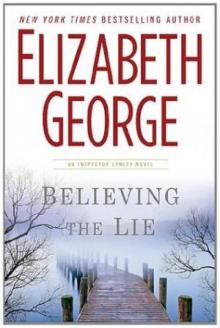 Believing the Lie il-17
Believing the Lie il-17 The Edge of the Light
The Edge of the Light SW01 - The Edge of Nowhere
SW01 - The Edge of Nowhere A Place of Hiding
A Place of Hiding What Came Before He Shot Her il-14
What Came Before He Shot Her il-14 Payment In Blood
Payment In Blood The Punishment She Deserves
The Punishment She Deserves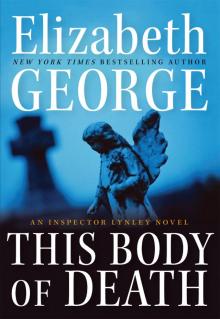 This Body of Death: An Inspector Lynley Novel
This Body of Death: An Inspector Lynley Novel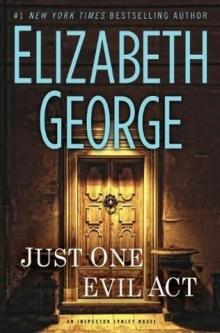 Just One Evil Act il-18
Just One Evil Act il-18 What Came Before He Shot Her
What Came Before He Shot Her Missing Joseph il-6
Missing Joseph il-6